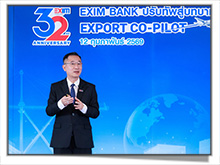EXIM Aim Strengthens
‘Export Co-pilot’

EXIM aim Strengthens ‘Export Co-pilot’ Role through Operational Revamp and Total Solutions, Enhancing Liquidity-Risk Management to Lead Thai Exporters into New Frontiers under New Global Trade Rules.
Mr. Charat Rattanaboonniti, President of Export-Import Bank of Thailand (EXIM Thailand), announced EXIM Thailand’s policy directions and strategic positioning as the Bank marks its 32nd anniversary and enters its 33rd year of business operations on 17 February 2026, at EXIM Thailand’s Head Office on 12 February 2026. Mr. Charat stated that the global economy continues to face intensified fragility and volatility, driven by multiple risk factors, including trade war and escalating, prolonged geopolitical tension that disrupts global supply chains, trade, and investment. Major economies are showing signs of a slowdown, while the Thai baht has experienced high volatility due to external factors, increasing risks to export revenues and costs. Energy and logistics costs also remain elevated.
At the same time, global trade rules are evolving rapidly and becoming increasingly complex, particularly with the rise of non-tariff barriers, environmental standards, and sustainability requirements, which are now critical conditions for access to global markets. Climate change has further escalated business risks, as reflected in the severe flooding in southern Thailand in 2025, adding to uncertainties for Thai enterprises.
In this context, Thai entrepreneurs, especially SMEs, continue to face structural challenges, including limited access to capital and liquidity, insufficient market information and knowledge, constraints in expanding trade networks, and difficulties in managing risks related to exchange rates, buyer countries, and overseas buyers themselves. These factors directly undermine competitiveness and growth potential in global markets. As a state-owned specialized financial institution under the Ministry of Finance, EXIM Thailand is repositioning itself as an “Export Co-pilot,” providing end-to-end support grounded in a deep understanding of export trends, risk management, and the practical needs of exporters. This support spans advisory services, knowledge enhancement, liquidity provision, and comprehensive risk management tools at every stage of business operations.
In 2026, EXIM Thailand will further advance its Export Co-pilot role through concrete actions by enhancing its suite of total solutions for Thai exporters, particularly SMEs, to help them navigate global volatility and overcome domestic structural constraints. The Bank emphasizes strengthening risk protection through loan packages bundled with export credit insurance facilities and foreign exchange risk management instruments to enhance liquidity and competitiveness. In parallel, EXIM Thailand is revamping its work processes through innovation and digital transformation to enable data-driven decision-making, strengthen cybersecurity, and manage risks in a holistic manner.
These efforts are implemented under the S-M-A-R-T strategy, comprising SME Export Grooming to elevate Thai entrepreneurs to international standards, Market Expansion to unlock global trade opportunities, Advocacy and Sustainability to promote awareness and sustainable growth, Revamp Digital Systems to enhance digital capabilities and innovation supporting business expansion, and Teamwork Spirits to foster the EXIM One Team culture that drives Thai businesses, EXIM Thailand itself, the country, and the world toward sustainability.
EXIM Thailand also places strong emphasis on non-financial support through capacity-building workshops and development programs to help Thai exporters adapt to global changes and comply with new global trade requirements. These efforts are reinforced through collaboration with public and private sector partners, including the Department of International Trade Promotion, Department of Foreign Trade, Board of Investment, Federation of Thai Industries, Board of Trade of Thailand, and Thai National Shippers’ Council. The objective is to empower Thai producers and exporters across the supply chain to grow sustainably, with readiness in financing, market intelligence, production processes, and ESG-oriented business practices aligned with demand for high-value and environmentally friendly products in emerging markets.
For its 2025 operating results in enhancing liquidity, stimulating exports, and opening new markets, EXIM Thailand recorded new loan approvals of 54,346 million baht to strengthen liquidity and support the continuity of Thai businesses amid global volatility and intense competition. The Bank also promoted risk diversification by expanding into New Frontier markets to reduce reliance on traditional markets. Loan approvals in CLMV countries (Cambodia, Lao PDR, Myanmar, and Vietnam) and other new markets totaled 9,125 million baht. As a result, total outstanding loans and commitments reached 191,800 million baht as of the end of 2025, while export credit insurance and investment insurance recorded 194,564 million baht in insurance business turnover.
In promoting investment for the future, EXIM Thailand is committed to advancing Thai industries toward high-tech manufacturing and the green economy. As of the end of 2025, the Bank recorded 91,650 million baht in outstanding loans and commitments supporting sustainable investments such as clean energy, the circular economy, and greenhouse gas reduction technologies, accounting for 47.78% of total outstanding loans. This reflects EXIM Thailand’s role in helping businesses of all sizes upgrade their production processes to meet international standards and improve global market access.
n empowering entrepreneurs, EXIM Thailand continues to develop both new and existing exporters for sustainable global growth through collaboration with the public sector, private sector, and academic institutions. A key initiative is the “EXIM 2X” program, designed to cover all dimensions of export business, from access to finance and risk management tools to international market penetration strategies, logistics management, and ESG-based business operations. The Bank also creates trade opportunities through business matching activities and various Export Studio programs throughout the year. These efforts have enabled a cumulative total of 25,036 entrepreneurs to enhance their capabilities.
In terms of asset quality management, EXIM Thailand prioritizes proactive risk management to maintain a healthy loan portfolio through the “Khun Soo, EXIM Chuay (You Fight, EXIM Helps)” measures, enabling borrowers affected by economic conditions to rehabilitate their businesses and effectively reduce debt burdens. The Bank’s non-performing loan (NPL) ratio stood at 3.66% as of the end of 2025, broadly unchanged from the previous year despite uncertainties facing the business sector. An allowance for expected credit loss was set aside at 17,139 million baht, resulting in a high NPL coverage ratio of 261.85%. Net profit for 2025 totaled 1,904 million baht.
“EXIM Thailand stands ready to fulfill its role as an Export Co-pilot, enhancing liquidity and strengthening risk management to equip Thai exporters with the readiness and confidence to compete under the new global trade rules and to turn change into opportunities for sustainable growth,” said Mr. Charat.
Go To Lead
|



